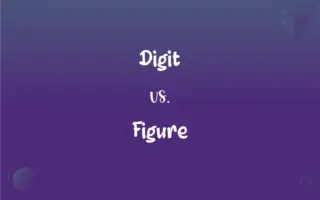Complement vs. Adjunct: What's the Difference?
Edited by Janet White || By Harlon Moss || Updated on November 7, 2023
Complement is a word or phrase that is necessary to complete the meaning of a sentence, while an adjunct is an optional part that adds extra information.

Key Differences
A complement is a word or phrase that is necessary to complete the meaning of a given expression in a sentence. An adjunct is an optional part of a sentence that modifies a verb or clause but is not required to complete the sentence's meaning.
Complements are integral to a sentence, providing necessary information that completes the meaning of a clause. Adjuncts add non-essential information, such as time, manner, place, and reason, which can be removed without altering the fundamental meaning of the sentence.
In grammar, a complement often directly follows the verb or linking verb and identifies or describes the subject. Adjuncts, on the other hand, can be moved to different positions in the sentence or omitted entirely without affecting the grammatical correctness.
Complements include subject complements (which follow a linking verb and describe the subject) and object complements (which follow and modify the direct object). Adjuncts are typically adverbial phrases or clauses providing additional context.
Complements can be obligatory for certain verbs that require additional information to make sense. Adjuncts are always optional and often provide circumstantial details, enhancing but not completing a sentence’s meaning.
ADVERTISEMENT
Comparison Chart
Function in a sentence
Completes the meaning of a sentence.
Adds extra information to a sentence.
Necessity
Essential for sentence completeness.
Optional and can be removed.
Types
Subject and object complements.
Adverbial, nominal, and clausal adjuncts.
Position
Fixed position related to verb or object.
Flexible position in the sentence.
Dependence
Depends on a specific verb or adjective.
No dependence on other sentence elements.
ADVERTISEMENT
Complement and Adjunct Definitions
Complement
In math, an angle that, when added to another, equals 90 degrees.
A 30-degree angle is the complement of a 60-degree angle.
Adjunct
A word or phrase used to embellish or modify.
In the sentence, 'She sings beautifully,' 'beautifully' is an adjunct.
Complement
In color theory, a color that, when combined with another, creates white or black.
Green is the complement of red.
Adjunct
An accessory or complement in various contexts.
This software is an adjunct to the main product.
Complement
A grammatical term for a word that completes a verb.
The soup was a perfect complement to the main dish.
Adjunct
An additional and non-essential part of a sentence.
She will travel tomorrow, with tomorrow being an adjunct.
Complement
The number of people required to fill a quota or complete a team.
We reached our full complement of staff for the project.
Adjunct
Something added or connected to a larger or more important thing.
He is working as an adjunct to the research team.
Complement
A thing that contributes extra features to something else.
Her scarf is a great complement to her outfit.
Adjunct
An assistant or subordinate in certain professional roles.
She was hired as an adjunct professor at the university.
Complement
Something that completes, makes up a whole, or brings to perfection
A sauce that is a fine complement to fish.
Adjunct
Something attached to another in a dependent or subordinate position.
FAQs
Is a complement always required?
For certain verbs and constructions, yes, a complement is required.
Are adjuncts always adverbs?
No, they can also be adverbial phrases, prepositional phrases, or clauses.
What does complement mean in a sentence?
It's a word or phrase needed to complete the meaning of a sentence.
How do I identify a complement in a sentence?
Look for a word or phrase that completes the idea of what the subject is doing or being.
Can a sentence have both a complement and an adjunct?
Yes, a sentence can include both components.
Can an adjunct become a complement?
No, adjuncts are by definition non-essential and cannot become complements.
Are complements used in questions?
Yes, when the question requires it for completeness.
Do adjuncts affect the tense of a sentence?
No, they do not affect the tense.
Do all sentences need complements?
Not all, only those with verbs or linking verbs that require additional information.
Can adjuncts be omitted in imperative sentences?
Yes, adjuncts can be omitted without changing the imperative nature.
What is an adjunct in grammar?
An adjunct is an optional part of a sentence that adds information.
Can an adjunct provide a contrast?
Yes, adjuncts can provide contrast, conditions, reasons, and other information.
Can the removal of an adjunct change the meaning of a sentence?
It can change the detail but not the fundamental meaning.
Do different types of complements exist?
Yes, there are subject complements and object complements.
Can complements be phrases?
Yes, complements can be phrases or single words.
Can a complement be part of a compound sentence?
Yes, as long as it completes the thought of the clause it belongs to.
Are there different types of adjuncts?
Yes, including adverbial, nominal, and clausal adjuncts.
Can a noun serve as a complement?
Yes, as a subject or object complement.
How do adjuncts enhance sentences?
They add context, detail, and richness to the narrative.
What role do adjuncts play in academic writing?
They provide precision and depth to the argument.
About Author
Written by
Harlon MossHarlon is a seasoned quality moderator and accomplished content writer for Difference Wiki. An alumnus of the prestigious University of California, he earned his degree in Computer Science. Leveraging his academic background, Harlon brings a meticulous and informed perspective to his work, ensuring content accuracy and excellence.
Edited by
Janet WhiteJanet White has been an esteemed writer and blogger for Difference Wiki. Holding a Master's degree in Science and Medical Journalism from the prestigious Boston University, she has consistently demonstrated her expertise and passion for her field. When she's not immersed in her work, Janet relishes her time exercising, delving into a good book, and cherishing moments with friends and family.































































